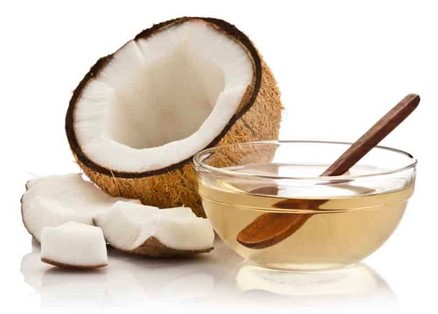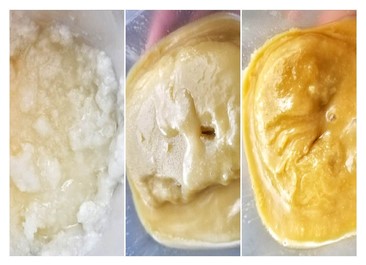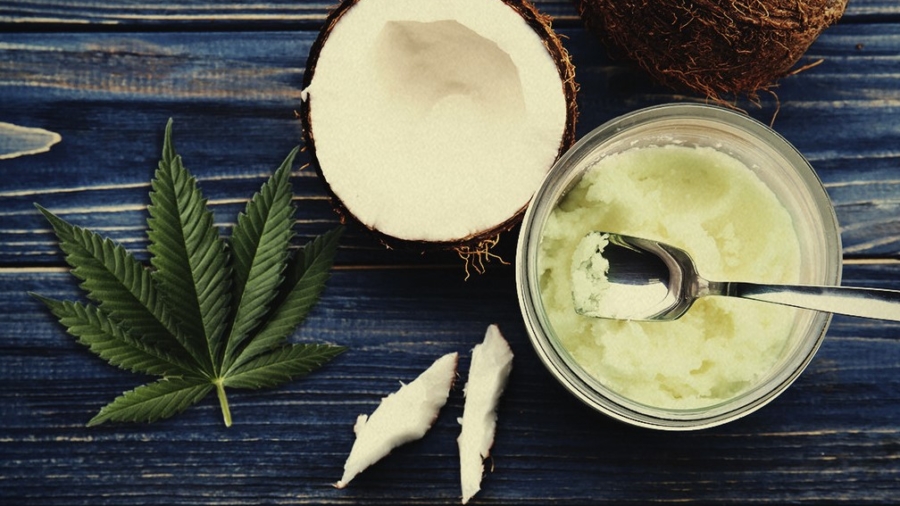Coconut oil has been increasingly embraced by the cannabis community in recent years due to its natural medicinal benefits and its superiority as marijuana transporter. This plant-based ingredient has the highest potency of saturated fats of any oil, making it the most effective medium to bind the fat-soluble THC.
For this reasons, cannabis coconut oil can produce a cleaner and longer lasting high than many other ingredients that are commonly used for cannabis infusion.

Cannabis coconut oil is an extremely versatile product that can be used on its own as a medical and therapeutic topical cream, or it can be combined with other ingredients, such as when cooking edibles.
Many cannabis experts are turning to canna-coconut oil over canna-butter and other fat sources because of the significantly outspoken support for this product, and the science that backs it up.
To help give you an idea of the many benefits that this organic product offers, we have compiled a list of its uses, compared it to other popular infused oils, and even provided a step-by-step recipe so that you can try it for yourself.
Benefits and uses of infused coconut oil
Coconut oil also contains other sets of beneficial acids that have been known to have a list of potential health benefits. Lauric acid is a great example—when digested, lauric acid creates a monoglyceride that acts as an antimicrobial.
These fatty acids are found in abundance in coconut oil, making it a top contender for those looking for a healthier oil base than butter or canola oil.
Another fantastic benefit of using coconut oil is it will remain solid at room temperature. This makes it a great medium for using as a topical agent. Furthermore, its solid state allows the oil to be easily stored via gelatin capsules, a widely popular and highly effective method of consuming cannabis.
Gelatin oil capsules are so simple and easy to make at home—the ingredients can be purchased from just about any pharmacy or online, making for a fun and simple DIY project.
Virgin, Refined, Hydrogenated or MCT?

Coconut oil comes in a variety of different types, and which one you choose can have a significant impact on how your edibles turn out.
Virgin Coconut Oil
Typically the result of an expelling process, virgin coconut oil is the natural, otherwise unaltered oil of the coconut – Again, expect it’s mild coconut scent and taste to carry over to your end product.
This oil has a rather low smoke point (only 350°F) meaning it can be good for lower-heat applications like sauteing or in baked goods but is unsuitable for high-heat tasks like basting or deep frying. If kept in a dark, cool location you can expect virgin coconut oil to have a shelf life of two to three years.
Refined Coconut Oil
After expelling the oil from the coconut meat it is then sent through a refinement process that can take several steps. Typically the oil is heated for deodorizing purposes and then filtered to remove impurities and strip away bacteria – This gives it a much higher smoke point (near 425°F) and no overt flavor. Expect refined coconut oil to have a shelf life of around six months.
Hydrogenated Coconut Oil
This is coconut oil that has been partially hydrogenated to help increase it’s solidity and shelf life in warmer environments. Unfortunately the hydrogenation process also creates trans fats, which as nearly any medical professional will tell you are terribly unhealthy. Staying away from hydrogenated oils of any type is usually a smart decision.
MCT Coconut Oil
Part of the fad “keto diet” wave, the “MCT” in “MCT Coconut Oil” stands for “medium-chain triglycerides”. MCTs are saturated fats that contain a shortened chain of carbon atoms, enabling them to be processed more quickly (and thus release energy faster) than fats with a long chain of carbon atoms – Health benefits to this are somewhat outside the scope of our article/website, but when combined with a diet that forces the body into ketosis these medium-chain triglycerides can be beneficial.
MCT coconut oil (also referred to as “fractionated coconut oil”, due to the refining process) can be used for cannabis infusions, but MCT coconut oil has a very low smoke point (only 320°F), meaning anything beyond relatively mild heat will make your oil burn (taking your precious THC with it). If you are determined to infuse MCT coconut oil, we recommend using it for cold/raw purposes only.
How to make cannabis infused coconut oil
Aside from the fact that you can purchase coconut oil relatively inexpensively from just about anywhere, the process of decarboxylating and infusing cannabis into coconut oil requires only a few simple ingredients and can be done at home with minimal effort.
Ingredients:
- 1 cup of ground cannabis flower (7-10 grams)
- 1 cup of coconut oil
Materials:
- Strainer or cheesecloth
- Grinder (a simple hand grinder works best; appliances like blenders and coffee grinder pulverize the cannabis, resulting in edibles with bad tasting plant material)
- Double-boiler, slow cooker, saucepan, etc.
Directions:
- Grind your cannabis. You can include the entire plant, just the flower, a little bit of both—this is all a matter of preference. Just keep in mind that anything small enough to fit through the strainer will end up in your finished product, so again, do not grind your cannabis to a fine powder.
- Combine oil and cannabis in your double-boiler, slow cooker, or saucepan and heat the two together on low or warm for a few hours. This allows for decarboxylation (activation of THC) without scorching (which destroys the active ingredients). Cooking can be done a variety of ways: in a slow cooker on low for 4-6 hours, stirring occasionally; in a double-boiler on low for at least 6 hours (8 is better), stirring occasionally; or in a simple saucepan on low for at least 2-3 hours, stirring frequently (a saucepan is most susceptible to scorching). In all cases, a small amount of water can be added to the mixture to help avoid burning. Note: whatever method you choose, temperature of the oil should not exceed 245°F.
- Strain and store the oil. Do not squeeze the cheesecloth; this will simply add more chlorophyll to your oil. All remaining plant material can be discarded or used in other dishes if you have the wherewithal. The oil’s shelf life is at least two months, and can be extended with refrigeration.
Simple Cannabis Infused Coconut Oil Recipe
Learning how to make cannabis infusions starts off with proper decarboxylation of your marijuana. Without being decarbed first your cannabis will not be activated and ready for making edibles, ultimately wasting your weed. We talk about this at length in our “Three Best Ways to Decarb Your Weed” article so if you’re unfamiliar with the term or just need a refresher, head there first before moving on to the next step.
Note: You cannot decarb your cannabis coconut oil once it has been infused – After it steeps it’s steeped, and there’s no going back, so make sure you decarb your weed before infusing. If using concentrates or other forms of processed THC your concentrate may already be decarbed – check your packaging to make sure.
To begin the infusion you’ll need the following:
- A double boiler; a heavy Pyrex bowl set on top of a water-filled pot can substitute
- Cheese cloth & butcher’s twine
- Your cannabis; 1 cup if using plant material, 4 grams if using kief or 2 grams if using concentrates (see note below)
- 1 cup coconut oil
Fill the bottom of your double boiler with water and set it onto your stove at a low simmer. Then, place both the coconut oil and your cannabis in the top section of your double boiler. Your steeping time will depend on your material used, but expect a minimum of four hours for kief, and six to eight hours for ground cannabis flower.
After your steep you’ll want to remove any remaining material inside – This is typically done by straining the oil through cheese cloth (coffee filters will also work but can be messy). After your cannabis infused coconut oil has completely strained through you’re all done – The infusion is ready to be used in almost any culinary application you can think of.
Magical Coconut Oil
Ingredients
- 14-28g Decarboxylated Botanicals, per cup of Oil used
- 2-5 cups Refined Coconut Oil
- 1 tablespoon Magical Sunflower Lecithin, per cup of Butter
Directions
- Place all of the ingredients into the Magical Butter machine and secure the lid.
- Set your temperature to 160°F and then press the 1 HOUR OIL button.
- After the cycle is complete, unplug the unit and remove the head of the appliance.
- Grab a large bowl or measuring cup and secure your Purify Filter bag in it. Put on your Magical Glove, and pour the contents slowly through your Purify Filter, squeezing gently to get all of your extraction.
- Pour directly into your Magical Butter Tray, formed molds, or other storage container and set in the fridge.

I’ve seen some recipes that tell you to decarb the weed before putting the weed and oil together. My question is does – that step of decrarbing the weed matter or could I just keep the weed cook in a crock pot longer? Thanks.